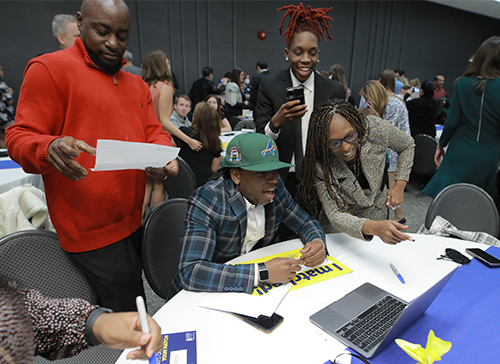Antonio Jackson remembers leafing through his mother’s textbooks as a child when she was studying to become a nurse.
He’d try to read them as best as he could, sounding out the complicated words and attempting to decipher what they meant. While the subject matter was well above his head, the exercise inspired him and set the tone for his future career path.

CELEBRATING SUCCESS: UToledo recognizes the Class of 2022 with a series of stories featuring students receiving their degrees at spring commencement.
“It showed me the dedication you had to have to do something like that,” he said. “She was a mother, she was working a job and she was going to school full time. She showed me this is possible, but it takes a lot of work.”
Jackson put in that work.
He will graduate from The University of Toledo May 20 with a medical degree and head to Emory University — where his mom now works as a nurse — to embark on an emergency medicine residency.
“It’s a dream come true, absolutely,” he said. “This was my top choice, and it means a lot that Emory took a chance on me. It’s an amazing program full of extremely smart people. I’m happy and humbled to be able to have this experience.”
Jackson grew up in suburban Atlanta and went to Morehouse College for his undergraduate degree. He also earned a master’s degree at Barry University in Miami.
As he was preparing to apply for medical school, Jackson attended a major conference aimed at recruiting underrepresented minorities and increasing diversity among medical colleges.
“I met some current students from Toledo there and everyone was very down-to-earth. I hadn’t had Toledo on my radar before then but after speaking to them and learning more about the institution, they were,” he said. “I think one of the biggest things is I felt like I would have support when I was there.”
Reflecting on his four years at UToledo, Jackson said he found that strong support — both from fellow students who were willing to help and faculty members, such as Dr. Mohamad Moussa.
Moussa, an associate professor of emergency medicine and director of the emergency medicine residency program, said some of Jackson’s strongest assets are his dedication and empathy for his patients.
“He takes the time to explain to them everything they need to know about their health in the emergency department,” Moussa said. “Antonio continuously wants to learn and increase his medical knowledge to best care for his patients. I can say with full confidence that he will be a successful emergency medicine resident and future emergency medicine physician leader.”

Surrounded by family members on Match Day, March 21, Antonio Jackson (sitting) will embark on an emergency medicine residency at Emory University, where his mom, right, works as a nurse.
Jackson said he sees significant importance in healthcare providers being able to relate to their patients, particularly among minority groups who are not well-represented in medicine.
Though more than 13% of Americans identify as Black, just 5% of active U.S. physicians identify as Black, according to the Association of American Medical Colleges.
That disparity wasn’t on Jackson’s mind when he decided in high school that he wanted to study medicine, but it’s become an important focus as he grew engaged in social justice issues and learned more about health inequality.
“As I got older and I recognized this is an issue, it definitely became part of my personal mission to help increase underrepresented minorities in medicine,” he said. “It’s important for healthcare in general to see a diverse set of clinicians caring for patients in whatever hospital they go to. Anywhere and everywhere, you should have a level of diversity that at a minimum reflects the community in which you serve.”
Not long after securing his own med school spot at UToledo, Jackson and several graduate school classmates established an organization called C.O.D.E. Med to help better prepare underrepresented minorities who plan to apply for medical school.
“We felt like we had a wealth of knowledge we no longer would use and we didn’t want it to go to waste,” he said. “We started helping friends, but there’s a whole bunch of other students who could use this information, so that’s what we did.”
The organization pairs mentors with aspiring physicians for free help with things such as personal statements, shadowing opportunities, interview strategies and MCAT guidance.
Jackson also was president of the UToledo chapter of the Student National Medical Association, a group dedicated to supporting minority medical students.
As he prepares to graduate, Jackson said he is both grateful for the opportunity to train at one of the top emergency medicine residency programs in the country and hopeful that he can continue to inspire others.
“I think it’s valuable and powerful to see someone like me come back home, train there and hopefully work in that area after residency and care for those patients,” he said. “I’m also so thankful for my parents. Their support is appreciated more than they would ever know.”